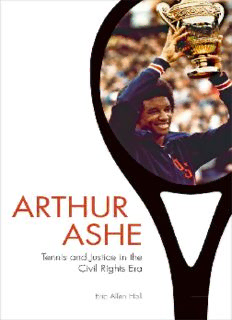
Arthur Ashe: Tennis and Justice in the Civil Rights Era PDF
Preview Arthur Ashe: Tennis and Justice in the Civil Rights Era
Arthur Ashe This page intentionally left blank Arthur Ashe Tennis and Justice in the Civil Rights Era eric allen hall Johns Hopkins University Press Baltimore © 2014 Johns Hopkins University Press All rights reserved. Published 2014 Printed in the United States of America on acid- free paper 2 4 6 8 9 7 5 3 1 Johns Hopkins University Press 2715 North Charles Street Baltimore, Mary land 21218- 4363 www .press .jhu .edu Library of Congress Cataloging- in- Publication Data Hall, Eric Allen. Arthur Ashe : tennis and justice in the Civil Rights era / Eric Allen Hall. pages cm. Includes bibliographical references and index. ISBN- 13: 978- 1- 4214- 1394- 5 (hardcover : alk. paper) ISBN- 13: 978- 1- 4214- 1395- 2 (electronic) ISBN- 10: 1- 4214- 1394- 9 (hardcover : alk. paper) ISBN- 10: 1- 4214- 1395- 7 (electronic) 1. Ashe, Arthur. 2. Tennis players— United States— Biography. 3. African American tennis players— Biography. 4. Civil rights— United States. 5. African Americans— Civil rights— History— 20th century. I. Title. GV994.A7H35 2014 796.342092—dc23 [B] 2013043573 A cata log record for this book is available from the British Library. Special discounts are available for bulk purchases of this book. For more information, please contact Special Sales at 410- 516- 6936 or [email protected]. Johns Hopkins University Press uses environmentally friendly book materials, including recycled text paper that is composed of at least 30 percent post- consumer waste, whenever possible. For my parents, Don and Cathy Hall, who always encouraged me to follow my heart This page intentionally left blank Contents Ac know ledg ments ix Introduction 1 1 Richmond 6 2 UCLA 34 3 An Emerging Activist 64 4 Bright Lights and Civil Rights 97 5 Tennis Wars 119 6 Defeat and Victory in South Africa 143 7 Transitions 179 8 The Comeback 207 9 Triumph and Tragedy 235 Conclusion 269 Notes 273 Essay on Sources 315 Index 323 This page intentionally left blank Ac know ledg ments As a child growing up in suburban Chicago in the days before the Internet, I would entertain myself for hours by bouncing a rubber ball against the wall of my family’s brick house. I imagined myself as Cubs second baseman Ryne Sandberg hitting a home run or pitcher Greg Maddux hurling a complete game. In the eve- nings I would peck away on a typewriter, compiling an imaginary box score from the day’s imaginary game. I was completely in love with sports, and I even dreamed of a career in sports broadcasting, hoping to join the ranks of Harry Caray and Ernie Harwell. That idea didn’t quite work out, but I’m still able to off er commentary on pop u lar culture as a historian of African American history. Bill “Doc” White fi rst encouraged me to pursue a PhD in history when I was only a freshman at Saint Joseph’s College. His unwavering belief in me mattered more than he’ll ever know. Bill is a great professor and an even better human being. At Purdue University I was fortunate to work with and learn from a number of talented scholars. My major professor, Randy Roberts, encouraged this project from the beginning and treated me more like a colleague than his student. He was always available to talk about my work, yet he gave me the space that I needed to make the project my own. Nancy Gabin, despite advising many graduate students in the department, read my entire manuscript and off ered support and guidance throughout my graduate career. Neil Bynum, Darren Dochuk, Jen Foray, and Mike Morrison took time away from their busy schedules to read my work and listen to my ideas. Doug Hurt provided generous funding for conference travel. I am eternally grateful to my fellow graduate students, especially Johnny Smith. Johnny has read and off ered incisive feedback on nearly every grant pro- posal, article, and chapter that I have ever written. My deep conversations with Johnny have sharpened my understanding of the relationship between pop u lar culture and the black freedom movement. I am a better scholar for having met him. Jamal Ratchford, Andrew Smith, and Nate Corzine, also members of the Roberts cohort, helped me position my work within the fi elds of African
